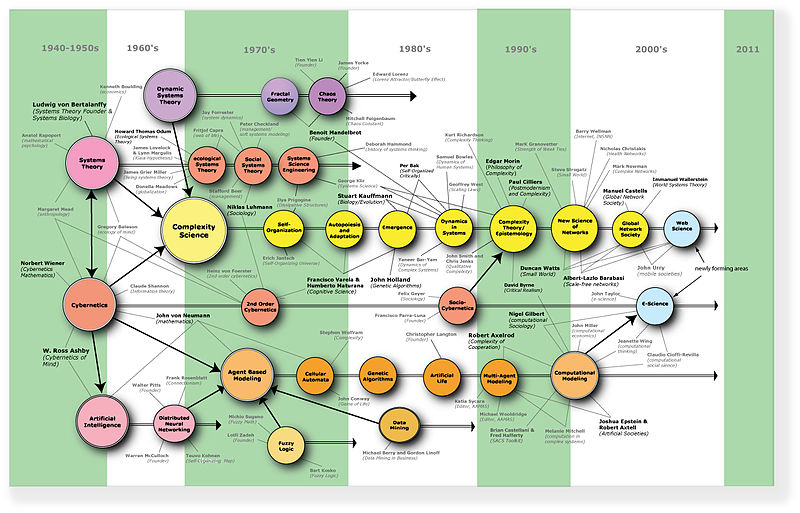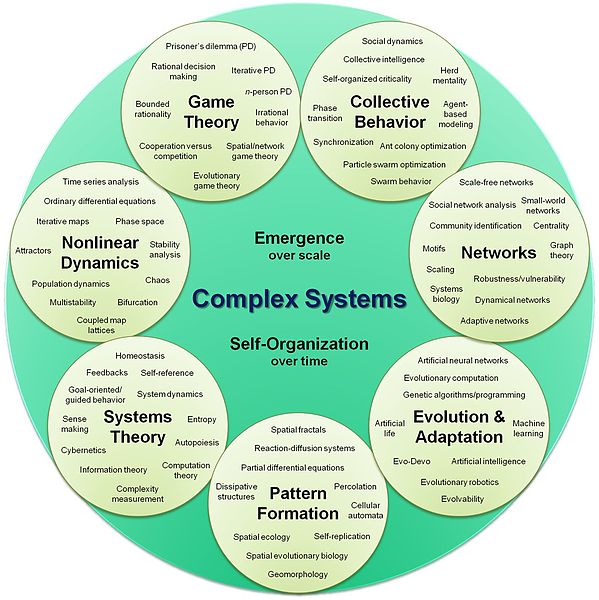
| Palaeos: |  |
Cosmic Evolution |
| Cosmic Evolution | Complex Systems |
Systems theory is a much broader field than biological evolution, and can be used to understand the emergence of complex structures, i.e. evolution, in the cosmic context. Since this is not an area of expertise for me, I have copied mostly verbatim the following material from Wikipedia. This sets the stage for a synoptic big picture view of evolution, which leads to an overview of "big history" and related topics. MAK111013
In general usage, complexity tends to be used to characterize something with many parts in intricate arrangement. The study of these complex linkages is the main goal of complex systems theory.
Definitions are often tied to the concept of a "system" a set of parts or elements that have relationships among them differentiated from relationships with other elements outside the relational regime. Many definitions tend to postulate or assume that complexity expresses a condition of numerous elements in a system and numerous forms of relationships among the elements. At the same time, what is complex and what is simple is relative and changes with time.
 A map of many of the leading scholars and areas of research in complexity science. Wikipedia |
One of the problems in addressing complexity issues has been distinguishing conceptually between the large number of variances in relationships extant in random collections, and the sometimes large, but smaller, number of relationships between elements in systems where constraints (related to correlation of otherwise independent elements) simultaneously reduce the variations from element independence and create distinguishable regimes of more-uniform, or correlated, relationships, or interactions.
Warren Weaver draws a distinction between "disorganized complexity" and "organized complexity".
Disorganized complexity results from the particular system having a very large number of parts, say millions of parts, or many more. Though the interactions of the parts can be seen as largely random, the properties of the system as a whole can be understood by using probability and statistical methods. An example is a gas in a container, with the gas molecules as the parts.
Organized complexity resides in the non-random, or correlated, interaction between the parts. These correlated relationships create a differentiated structure that can, as a system, interact with other systems. The coordinated system manifests properties not carried or dictated by individual parts. The organized aspect of this form of complexity vis a vis to other systems than the subject system can be said to "emerge," without any "guiding hand".
The number of parts does not have to be very large for a particular system to have emergent properties. A system of organized complexity may be understood in its properties (behavior among the properties) through modeling and simulation, particularly modeling and simulation with computers. An example of organized complexity is a city neighborhood as a living mechanism, with the neighborhood people among the system's parts - Wikipedia
 A visual, organizational map of complex systems broken into seven sub-groups. Diagram by (and copyright) Hiroki Sayama, D.Sc., Collective Dynamics of Complex Systems (CoCo) Research Group at Binghamton University, State University of New York. Wikipedia |
The equations from which complex system models are developed generally derive from statistical physics, information theory and non-linear dynamics, and represent organized but unpredictable behaviors of systems of nature that are considered fundamentally complex. The physical manifestations of such systems cannot be defined, so the usual choice is to refer to "the system" as the mathematical information model, without referring to the undefined physical subject the model represents.
Such systems are used to model processes in computer science, biology, economics, physics, chemistry, and many other fields. It is also called complex systems theory, complexity science, study of complex systems, sciences of complexity, nonequilibrium physics, and historical physics. A variety of abstract theoretical complex systems is studied as a field of mathematics.
The key problems of complex systems are difficulties with their formal modelling and simulation. From such a perspective, in different research contexts complex systems are defined on the basis of their different attributes. Since all complex systems have many interconnected components, the science of networks and network theory are important aspects of the study of complex systems. A consensus regarding a single universal definition of complex system does not yet exist. - Wikipedia
| Page Back: Cosmic Evolution | Unit Home | Page Top | Page Next: The Self-Organizing Universe |
content by Wikipedia, edited RFVS111024